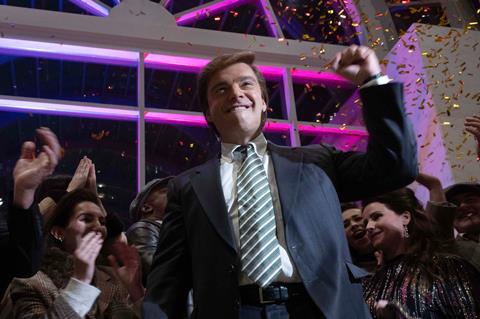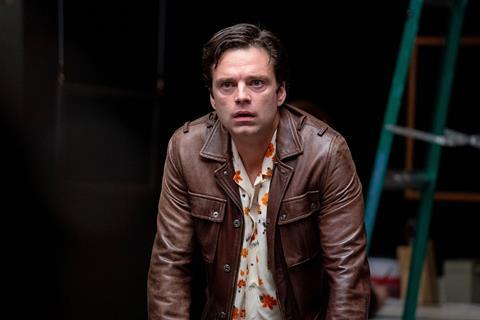The Bafta-and Oscar-nominated star of The Apprentice tells Screen why his choices can never be dictated by fear

Sebastian Stan was approached to play Donald Trump in The Apprentice back in 2019, during the US president’s first term in office. Back then, the Romania-born Stan, who moved to the US aged 12, was best known as Bucky Barnes — aka the Winter Soldier — in several Marvel movies, including Captain America: The Winter Soldier, and starring in indies such as I, Tonya.
“The great casting director Carmen Cuba called me and said, ‘There’s this incredible filmmaker, Ali Abbasi. You should see his film Border. He wants to do a film called The Apprentice, about the early days of Donald Trump and his relationship with Roy Cohn,’” recalls Stan. “This was before the pandemic, before January 6, so I was fascinated to hear his point of view. Having a European background myself, I was curious to hear how this international filmmaker would approach this American story.”
Beginning in early-1970s New York, when Trump was still working for his real-estate mogul father, The Apprentice details the aspiring property tycoon’s dream of turning a broken New York City into a thriving metropolis, his relationship with controversial lawyer Cohn (played by Jeremy Strong), who helped to make it a reality, and his first marriage.
“I remember being surprised by the script,” says Stan, who previously played real-life rocker Tommy Lee in Pam & Tommy and ice skater Tonya Harding’s husband Jeff Gillooly in I, Tonya. “I was also disturbed by how relatable things in the script seemed to be. From a film-buff’s perspective, it reminded me, thematically, of films like The Godfather Part II and Midnight Cowboy, but at the centre was this very current, prominent figure.”
Stan admits to having some apprehension about saying yes, but mostly about the audience’s stomach for “a story about this figure who has been so divisive, so loved and so hated, in an obsessive fashion. How do you offer a fresh perspective on someone who is in our lives on a minute-to-minute basis? How do you get somebody to spend two hours to look at this person and do it in a way that’s believable? Obviously, so much happened later, so then it became a question of, ‘Well, is this even safe?’”
Stan is alluding to comments made by Trump about the film, which the actor has previously said could inspire violence, although he says nobody on his team told him not to make the film.
“But the questions were different than on some other roles — ‘What is this movie bringing into your life?’ and, ‘Should a movie be told about this person?’ There was a CEO of a studio, at a dinner, who advised me not to do it because I was going to ‘alienate my audience’. I remember him telling me somebody like Hugh Jackman could do something like this, ‘But what are you doing when you’re still trying to establish your career?’”
At the time, Stan was on social media but eventually left. “I’ve had people say, ‘Are you going to look behind your back?’ But I’ve always had a very interesting relationship with fear. I grew up in a fear mentality in Romania with my parents, who were fighting against the communist system. I’ve also faced a lot of situations growing up in different countries where fear was always part of life. I would never want to be making decisions from a place of fear, so didn’t want to let that be the dominating factor in any way.”
Deep dive
Stan nails Trump’s voice, walk, mannerisms and, with the aid of prosthetics, physicality, but his performance never feels like an impersonation or caricature. “I did my diligence,” he says. “I read The Art Of The Deal, which he quote/unquote wrote, and various other biographies. I went back in time, [reading] every interview from the ’70s, trying to track where it all started, mixed with this very technical work of exposing myself to continuous footage and documentaries and audio, until things such as mannerisms, intonations, inflections, lips, ways of talking, certain repetitions of words, became second nature because I’d been practising it obsessively — like an instrument.”
The US president called the filmmakers “human scum” on his social network site, but Stan insists: “This was never meant to be a total hit on Trump. To some extent, it does him the most justice, which is why I find it interesting when responses about the film are always so negative, because I go, ‘Somebody took the time to look at your life and give you the benefit of the doubt, to some extent.’”
Indeed, The Apprentice paints its subject as something of a visionary in terms of his desire to regenerate New York. “There were very forward-thinking ideas, trying to bring business back, change Manhattan, bring tourism back,” says the 42-year-old actor. “But obviously there is deep anger, rage and a great deal of revenge motivating a lot of decision-making.”

Stan and Strong have been rewarded with Bafta and Oscar nominations for best actor and best supporting actor respectively — the first for both men — and Stan also won the Golden Globe for best musical or comedy actor for his other current awards contender, Aaron Schimberg’s A Different Man.
“It’s been such an uncertain journey, trying to get this movie made,” says Stan. “Wrapping on February 1, 2024, premiering at Cannes, and having one of our producers try to stop the release, the premiere in Cannes, then not knowing if we could find anybody willing to [release it].”
Briarcliff Entertainment distributed the film in North America last October, just before Trump’s re-election, where it grossed a mild $4m — but success in foreign markets takes the worldwide total to $17m. “To get to any nominations whatsoever was validating and gratifying,” says Stan. “To be talking about the Academy Awards and the Baftas, which is something I’ve only dreamt of, is surreal.”
Next is Marvel’s Thunderbolts*, but Stan also has several indie movies planned, including Fjord with Romanian director Cristian Mungiu and co-star Renate Reinsve, which will allow the actor to speak his native tongue. “I made a conscious choice in about 2018 — after I, Tonya — that I wanted to continue to explore projects that are challenging but also ask questions I’m not sure I know the answer to. I love comedies, I love action movies, but I’m also interested in going into those uncomfortable places with filmmakers I respect.”
Stan points to the films of Sidney Lumet as an example of what he admires and aspires to make. “You want to be part of a movie that stands the test of time and continues to offer something,” he says. “Network is still applicable today. Dog Day Afternoon. Those are the kind of films I grew up on. I’ve wanted to find that in a way, and, for some reason, these are the films” — he is talking about Craig Gillespie’s I, Tonya, Mimi Cave’s Fresh, A Different Man and The Apprentice — “that have found me. I would love to keep being at the forefront of these conversations that are not afraid to go to the core of what seem to be the issues of the times.”

























No comments yet